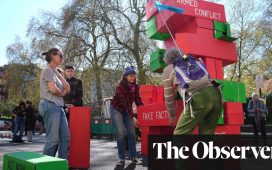
Barclays: 77% will do the majority of their festive sale shopping on the web (Image: Getty)
High streets across the country were much quieter than usual on Tuesday as many shoppers decided to do their Boxing Day bargain-hunting from home.
Very few queues were seen on London’s Oxford Street and at the Trafford Centre in Manchester. Meanwhile Leicester city centre and Nottingham were described as a “ghost town”.
This year, many retailers, including Marks & Spencer, John Lewis and Next, decided to keep their doors closed to give their staff an extra day off, which will have contributed to the low footfall.
But a change in shopping habits during the cost-of-living crisis has meant that many now prefer to do their shopping online.
According to Barclays bank, more than three quarters (77%) will do the majority of their festive sale shopping on the web.
Yet, with official sales figures for Boxing Day set to be released soon, experts still predict it could be the biggest Boxing Day in five years.
Analysts at Barclays Bank suggests that the average person will spend £253 in the sales, up from £229 last year and £162 in 2020.
Overall, it is expected that people will spend £4.6 billion on average in the post-Christmas shopping period, which will be the highest amount in five years.
In some parts of the country, footfall picked up as the day went on, with snaking queues seen in Newcastle as shoppers muscled their way in to stores to get their hands on a bargain.
But on Europe’s busiest shopping street – Oxford Street – shoppers said it still felt quieter than on previous Boxing Days.
Sharon Chen, 60, said she thought Oxford Street was “less busy” than it has been in previous years, adding that she was browsing the shops for children’s toys.
Ms Chen, who had travelled from Enfield into central London on Tuesday morning, said she thought people were less likely to spend money in the Boxing Day sales due to the cost-of-living crisis.
Tufael Ahmed, 47, who was on London’s Oxford Street, said: “We were here last year, and the queues were much longer – there’s a marked difference.”
Mr Ahmed, who works as a finance controller, said he thought the cost-of-living crisis had “definitely” affected what people were willing to spend.
He added: “I just don’t think people have money and you get the impression that the retailers have already discounted things before and now they’re taking it for granted.
- Support fearless journalism
- Read The Daily Express online, advert free
- Get super-fast page loading
“Obviously, mortgage payments and energy costs have gone up and that’s had an effect on what people are spending.”
Elsewhere, shopping centres and retail parks were deserted. Leicester’s Boxing Day sales got off to a quiet start, with very few queues in the city.
The Highcross Shopping Centre, which is usually thriving with shoppers eager to bag bargains, was a sea of downed shutters and the parking garage was nearly empty before 9am.
Despite the smaller than usual crowds, the public is still expected to splash the cash both in person and online in a bid to find bargains.
Retail expert Lisa Hooker, of accountants PwC, said retailers will offer “deep discounts” to shift unsold stock, with good deals expected on toys, tech, home furnishings and DIY.
Predicting spending levels in the Boxing Day sales is notoriously difficult, with a study by Barclays coming up with a figure of £4.7 billion, which is £1billion more than VoucherCodes.co.uk.
It said that fashion items such as clothes, shoes and accessories are the most sought-after products.
Karen Johnson, head of retail at Barclays, said: “Retailers will be encouraged by a strong end to the year’s ‘golden quarter’.
“This year’s findings also indicate that there will be a transformative shift in consumer priorities, as shoppers look to treat themselves after Christmas.
“Despite rising living costs, people still want to treat themselves and their loved ones.”











